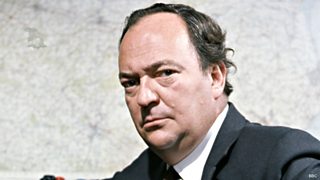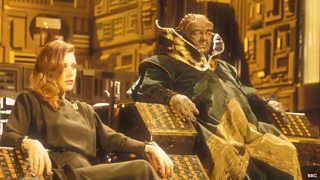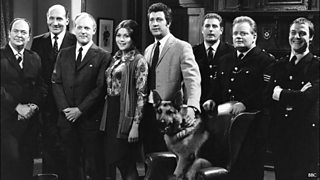The Sunday Post: Barlow at Large
Andrew Martin
�������� Genome

Stratford Johns is best remembered for playing gruff but humane detective Charlie Barlow
Alan Stratford Johns was born on 22nd September 1925 in Pietermaritzburg, Natal Province (now Kwa-Zulu Natal), South Africa. After service in the South African Navy during World War Two, he became involved in amateur acting and in 1948 decided to travel to the UK to work in the theatre professionally. Starting at Southend Repertory Theatre, he broke into films with minor roles in the mid-50s including a small part in Ealing comedy The Ladykillers. As with many an actor, while struggling to find work he supplemented his income with various jobs, including running a small hotel for actors in central London.
His credited involvement with the �������� began with an appearance in two episodes of the soap opera in November 1958. Various roles followed, including that of a police sergeant in the thriller serial The Days of Vengeance, co-written by the creator of Dixon of Dock Green, Ted Willis.
1961 saw him appear in two episodes of , and Big Time, in which one of his co-stars was Frank Windsor. Some months later, Johns and Windsor began a long career together when they were cast in a documentary-drama series based around the new ‘crime cars’ in use with Lancashire Constabulary. Initially called Crime Patrol, this was felt to be insufficiently dramatic, so the title was changed to Z Cars, based on the call-signs Z Victor 1 and Z Victor 2 assigned to the two main vehicles featured.
, Four of a Kind, written by Troy Kennedy Martin and directed by John McGrath, was transmitted on 2nd January 1962. Johns was cast as Detective Chief Inspector Charlie Barlow, and was an immediate hit as the irascible but effective officer in charge of the C.I.D. at Newtown police station. Under him was Frank Windsor’s Detective Sergeant John Watt, who as Crime Prevention Officer was directly responsible for the two Z Car crews.
Stratford Johns quickly made the part of Barlow his own, rationalising him as the kind of man who would have had a row with his wife and then sat up drinking whisky half the night, before coming to work with a hangover – certainly the character had a reputation for shouting at subordinates and suspects alike, and was often the target of complaints from senior police officers who insisted there were no Chief Inspectors who behaved like that. Barlow still became a much-loved character, as there was always an element of humour and humanity in Johns’ performance.
As with all the cast, he had to deal with the strain of long series of the show, and the fact they were almost all produced live. However the format of the series allowed for this, in that regular characters would not appear in every episode, or at least not with too many lines to learn…
Johns soon became a celebrity, with guest appearances on programmes such as The Kathy Kirby Show, , Hugh and I and Star Story, on which he read his own story . In 1964 he was featured in �������� for a Day on the �������� Service in an item called My Dream Boss. He also for a week and for Desert Island Discs – he had also issued an album of songs himself. More seriously, he fronted an appeal for Oxfam, as himself but .
Z Cars continued to be a success and Barlow remained a major part of its appeal, but gradually it was felt that it had started to become stale, and it was decided to end it in 1965. During the last series an edition of Line-Up Review (an off-shoot of Late Night Line-Up) called A to Z Cars showed the production of an episode through location filming and rehearsals to transmission, and together with his wife Nan Ryder and their children.

Johns' other roles included the Monarch in Doctor Who
However the end of Z Cars (which proved temporary, as it was revived in 1967) was not to spell the end of the characters of Barlow and Watt. A sequel was devised that would take them to another part of the country, the fictional ‘Wyvern’ district (effectively Bristol), where they would run one of the new Regional Crime Squads. They acquired a new set of subordinates and bosses, chief among the former being Detective Sergeant Harry Hawkins (Norman Bowler), who would stay with the series to the end of its run ten years later.
which began in January 1966, was about the ‘investigation of the criminal – not the crime’, and was called Softly Softly. John Watt was promoted to Detective Inspector, and through the run of the series made his way gradually up the ranks to Detective Chief Superintendent. Barlow was promoted immediately to DCS, but was fated never to rise higher, despite a couple of ‘near misses’.
Unlike Z Cars, Softly Softly phased out live episodes after the first year or so, so some of the strain associated with making it was reduced, although each season was still lengthy – usually at least 26 weeks (although this was less that Z Cars, and such long runs were not uncommon in the 60s). Barlow’s character went through the ordeal of being investigated for corruption in a three-episode story during the second series, which may have in the episode Selection a couple of months later. His original boss A.C.C. Calderwood (John Welsh) was replaced by A.C.C. Gilbert (John Barron), who had been involved in investigating him, though they went on to have a good working relationship. (Barron had fond memories of the Selection episode it as he chose it for the Star Choice repeat series in 1969.
After three and a half years of Softly Softly it was again decided to vary the formula. The idea was again to keep up with innovation in the police force, and this time it was the new Task Force concept that was chosen. Once more, this involved relocation of the central characters, now to the Medway town of ‘Thamesford’, which again allowed a refreshment of ideas and situations. Barlow was put in charge of CID with two Task Force units, helped by Watt and Hawkins (now an Inspector), and more new characters, who included instinctual Welsh Detective Sergeant Evans (David Lloyd Meredith), and lugubrious dog-handler PC Snow (Terence Rigby).
The change in format happened during the new series of Softly Softly in autumn 1969, and was timed to coincide with the start of regular colour transmission on ��������1. Originally to be named just Task Force, a compromise was reached to retain the old title this time – so it became Softly Softly: Task Force, although the first episode was still billed just as Softly Softly, with the name introduced in the end credits.
Watt, who had been divorced from his first wife during the run of Z Cars, was given a love interest, Dr Jean Morrow, in an early episode of Task Force. Barlow’s wife, despite a couple of fleeting glimpses, was one of those characters like Mrs Mainwaring in Dad’s Army who never really appeared properly (if she was seen briefly, Nan Ryder played her, uncredited).
After a couple of years of the new format, another experiment was tried, with Barlow being seconded to investigate a difficult case in Wales. The three-part story, made entirely on film and with some foreign location work, went out under the punning title in 1971. Following this, it was decided to develop this into a spin-off series proper. During the 1972/3 series of Softly Softly: Task Force, Barlow was again up for promotion – at which point it was decided to kill off his wife.
Despite an intensive interview process where he also had to deal with by a criminal he had once put away, Barlow was not promoted but ended up leaving the Thamesford force to work with the �������� Office, investigating particularly complex cases as a kind of troubleshooter. Once more, this was titled Barlow at Large, and John Watt became Barlow’s successor in Thamesford.

Stratford Johns (left) with the Softly Softly: Task Force cast in 1971
Barlow at Large saw Barlow working for suave civil servant A.G. Fenton (Neil Stacy), assisted by Detective Sergeant Rees (Norman Comer) and later Detective Inspector Tucker (Derek Newark). After one series the to Barlow, and an attempt was made to make it more action-packed and modern – largely by having a new title sequence and theme tune, though there was occasionally more filming abroad.
Somehow the concentration on Barlow alone never had the same appeal, and the long-running sparring with Watt was hard to replicate. There was a reunion between the characters in summer 1973, with Barlow and Watt now both Detective Chief Superintendents, re-investigating one of the most famous and mysterious series of historical crimes, in . As the two fictional detectives went over contemporary accounts and evidence of the Whitechapel murders, these were re-enacted in cutaway scenes. The series, made in the ��������’s Glasgow studios, got a mixed reception, but nevertheless there was a follow-up in 1976, Second Verdict, which had investigations of cases like the Lindbergh baby, the Reichstag fire, Lizzie Borden and the An odd and jarring mixture of drama and documentary, this never really excited much interest, and only one series was made.
Barlow had come to an end in 1975, and it was decided that Softly Softly: Task Force had run its course too, with its final series in 1976. Watt was still in charge, and there is a reference to his friend at the �������� Office in the last episode. With the advent of fast-paced film series like ITV’s The Sweeney, the ��������’s studio-bound offerings were starting to feel clunky. Z Cars was still on-going, though a shadow of its former self (even the venerable Dixon of Dock Green only in 1976).
Z Cars ended in 1978, with an attempt to recapture some of the gritty atmosphere of the earlier series, and a noticeably more down-beat tone. No longer made live since 1965, but now recorded on outside-broadcast video, it was still looking tired. The final episode was written and directed by the same people as the first, Troy Kennedy Martin and John McGrath. These two mavericks produced one of the of series television, entitled Pressure, transmitted on 20th September . Among its stranger elements were appearances by early stars Joseph Brady, Brian Blessed, Jeremy Kemp and Colin Welland as members of the public – their colleague James Ellis was still playing Bert Lynch, by now a uniformed Inspector. Frank Windsor made one last appearance as John Watt, back in Newtown to investigate a corruption case. Also featured was actor John Phillips, playing Chief Constable Robbins – who had been Barlow’s boss, as a Chief Superintendent, in the first episode. Somehow though, it felt as if the character should have been Barlow – whether or not that was the intention, it didn’t happen, so the fate of Charlie Barlow was left unresolved.
With the Z Cars franchise finally wound up, Johns continued a varied acting career until the late 90s, appearing in everything from feature films to the likes of and , and the dark Channel 4 series Brond. He was an excellent Magwitch in the ��������’s 1981 , and had a central role in an episode of . One of his last appearances as himself was in in 1996, where he reminisced about 1962 alongside Honor Blackman, Dennis Law and Bernard Cribbins . By the start of the 21st century his health was sadly failing, and he died at the age of 76 in early 2002. Never a huge star outside Britain, Stratford Johns nonetheless created in acting terms one of the great characters of the television age, who could be authoritative, funny, frightening – often in the course of one scene.
Every Sunday, Andrew Martin will be guiding you through the history of broadcasting by digging out archive gems and information from the �������� Genome listings.
